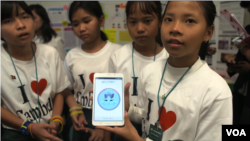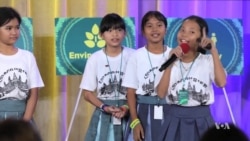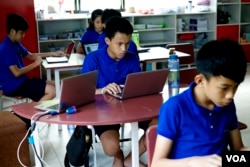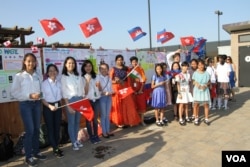Their pitch wasn’t a bid to be the next billion-dollar company, but rather to help craftspeople in Cambodia access international markets.
“Let’s fight poverty by using our app. Don’t find customers for your product, find products for your customers,” says Lom Dara Soucheng, 12 who led the team that created “Cambodia Identity Product”.
“We want to increase employment for Cambodians,” Chea Sopheata, 11, told the judges, “so there will be a reduction in Cambodians migrating to work in other countries, reducing poverty through making income and providing charity to local Cambodians.”
To make it to the August 7 - 11 Technovation competition, the girls had to build a mobile app, and create a business plan, that addressed at least one of the U.N. Development Goals.
While Cambodia has seen strong economic growth, especially in the tourism industry, globalization has also arguably fueled economic inequality. These Cambodian girls think they can help be part of the solution.
“We want to promote our culture to people from all over the world,” Dara Soucheng says.
No-one would expect these girls to have all the answers, but their participation in the competition was itself the main goal of Technovation.
Across the world, the number of women in STEM (science, technology, engineering and mathematics) professions remains low, with only about 14 percent of students choosing to study information technology-related classes in 2010 - the last time comprehensive figures were made available. Some attribute this disparity to unequal access to education, information, and a lack of female role models in those professions.
Programs such as Technovation are aimed at reversing that trend.
Tara Chklovski, the founder and CEO of Iridescent, the non-profit that launched Technovation in 2010, says that for the first time, “technology can really help girls have a strong voice and help us have a society that has equality.”
The Cambodian team were all drawn from underprivileged backgrounds, but had the opportunity to gain a quality education by being selected for the Liger Learning Center’s (LLC) programs. LLC is a local NGO that is pioneering project-based and experiential learning techniques.
Moni Mau, a Cambodian-American software engineer who also has a young daughter, heard about the Cambodian entrants to Technovation and ran to the event, impressed with the young coders from his home country.
“Compared to a lot of kids in the U.S., who don’t know how to do this and a kid in Cambodia with the current situation, the current poverty over there...[they] can do this much, and they can get this far. I was impressed,” he said.
Pauline Seng, a Cambodian-American program manager at Google, was similarly surprised and impressed with the girls’ success.
“There’s going to be so many people who aspire to reach this stage and also inspire other people to get involved in technology,” she said.
Technovation’s grad prize this year went to entrants from Hong Kong. “I’m very happy that our team made it this far,” says Yos Serei Sabda, another of the Cambodian entrants.
Although the girls did not win the grand prize, they are proud to have made it here to Google and Silicon Valley.
Asked whether they believe that Google will one day be headed by a women, the girls replied in unison: “Yes!”














